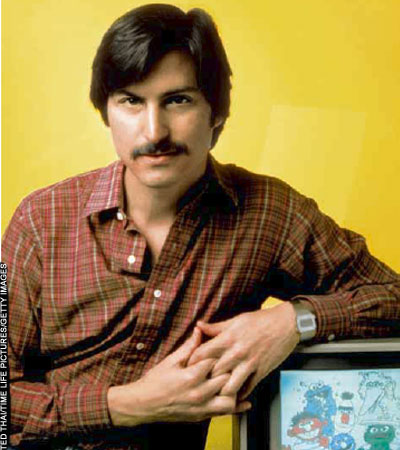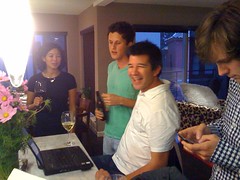There are a lot of times in the world where people tell me what to do. Things like, “I  need the deck by tonight.” or “Can you meet me on Sunday to talk about the deal?” Sometimes i like doing it and sometimes i don’t. Here’s what i do know though: I always like doing what i believe in and i always hate doing what i don’t think is right.
need the deck by tonight.” or “Can you meet me on Sunday to talk about the deal?” Sometimes i like doing it and sometimes i don’t. Here’s what i do know though: I always like doing what i believe in and i always hate doing what i don’t think is right.
This is why i love stories about people who were told they were wrong and they persevered and proved their naysayers wrong. Three stories stick out in my head:
Steve Jobs got forced out of Apple because he had a crazy idea that hardware can be beautiful. Years later he came back to prove that he was right 20 years before. Now he’s dominating the music industry, the largest shareholder of the largest media company (Disney) and revolutionizing the mobile technology industry
In-N-Out Burger was a fast-food joint just like all the others in the 50’s. Ray Kroc wanted to buy it and franchise it. That was the thing to do. McDonald’s was doing it, so was Taco Bell and Wendy’s and everyone else. But Harry Synder (the founder) of In-N-Out told Ray to pound salt. He had a different idea. Instead of “lower costs and increase sales” it was “do one thing and do it as well as you can.” That one thing was the In-N-Out burger. He never sold. The Synder family has purchased every In-N-Out with cash. He wanted to know every meat distributor by his first name. That’s why the #1 requested meal backstage at the Oscars is In-N-Out and why there’s over an hour wait at a place where burgers are $2.
 John Lasseter lost his job at Disney back in ‘86. He was fired by an old line animator who said there was no future in computer animation. Lasseter slept under his desk, and a decade later delivered Pixar’s first hit, “Toy Story”. After story he and Pixar have gone for 10 for 10. Nothing is a sure thing in media. And John is 10 for 10.
John Lasseter lost his job at Disney back in ‘86. He was fired by an old line animator who said there was no future in computer animation. Lasseter slept under his desk, and a decade later delivered Pixar’s first hit, “Toy Story”. After story he and Pixar have gone for 10 for 10. Nothing is a sure thing in media. And John is 10 for 10.
All of these guys did it their way and the world is a better place because of it. We can only hope that we have the conviction and passion and talent of them in our own lives.
Related articles by Zemanta
- Disney/Pixar’s John Lasseter Talks ‘Rapunzel’ Casting, ‘Toy Story 3’ Plot, ‘Cars 2’, ‘Winnie the Pooh’ and More! (cinematical.com)
- “‘Toy Story 3’ backstory revealed by Pixar’s John Lasseter” (gointothestory.com)
![Reblog this post [with Zemanta]](http://img.zemanta.com/reblog_c.png?x-id=02417067-2765-4878-a566-c1887329314e)
 While at Dartmouth, Theodor was editor of Dartmouth’s comedy magazine called The Jacko. That is until he got caught drinking on Easter eve and got kicked out. By his fraternity (Caste and Gauntlet) he was voted least likely to succeed and he graduated with a 2.4 in 1925. Given all that he managed to go out and sell more than 222 million books (66 titles). That’s pretty amazing
While at Dartmouth, Theodor was editor of Dartmouth’s comedy magazine called The Jacko. That is until he got caught drinking on Easter eve and got kicked out. By his fraternity (Caste and Gauntlet) he was voted least likely to succeed and he graduated with a 2.4 in 1925. Given all that he managed to go out and sell more than 222 million books (66 titles). That’s pretty amazing
![Reblog this post [with Zemanta]](http://img.zemanta.com/reblog_c.png?x-id=ac187dfd-c2ee-4fb6-a9c8-3bef4c5f1c9d)


![Reblog this post [with Zemanta]](http://img.zemanta.com/reblog_e.png?x-id=3ba29ba1-058f-4bb1-91c7-f634c52b6365)
 This is a great 5 minute video from the British version of American Idol. It’s the story of a 47 year old Susan Boyle and her audition for the show. This is why the web beats mainstream TV. The fact that i can watch this little clip which is better than 90% of the scripted shows on network television is why i have great love for the internet.
This is a great 5 minute video from the British version of American Idol. It’s the story of a 47 year old Susan Boyle and her audition for the show. This is why the web beats mainstream TV. The fact that i can watch this little clip which is better than 90% of the scripted shows on network television is why i have great love for the internet.
![Reblog this post [with Zemanta]](http://img.zemanta.com/reblog_e.png?x-id=cfdc722a-d309-45b6-a405-e0b4d33f3b54)

![Reblog this post [with Zemanta]](http://img.zemanta.com/reblog_e.png?x-id=5ac901c5-7874-4c5b-9e5b-6a62308fcd3d)

![Reblog this post [with Zemanta]](http://img.zemanta.com/reblog_e.png?x-id=20055859-65ed-42c7-9853-e3b214ac49d7)

![Reblog this post [with Zemanta]](http://img.zemanta.com/reblog_e.png?x-id=482ba4f5-633d-4230-903a-7dca5403b59e)